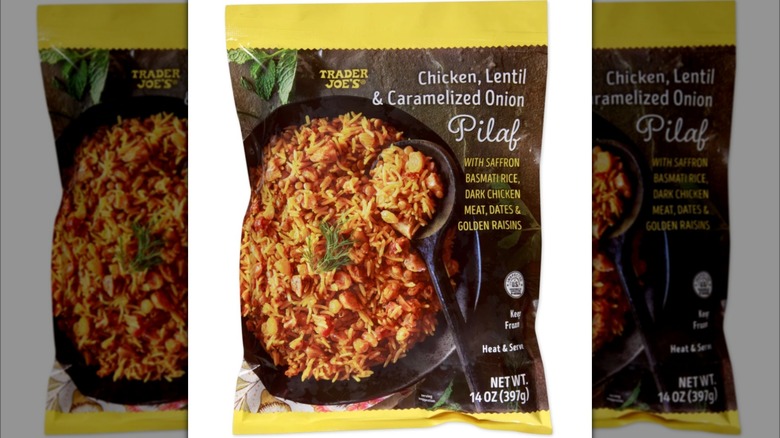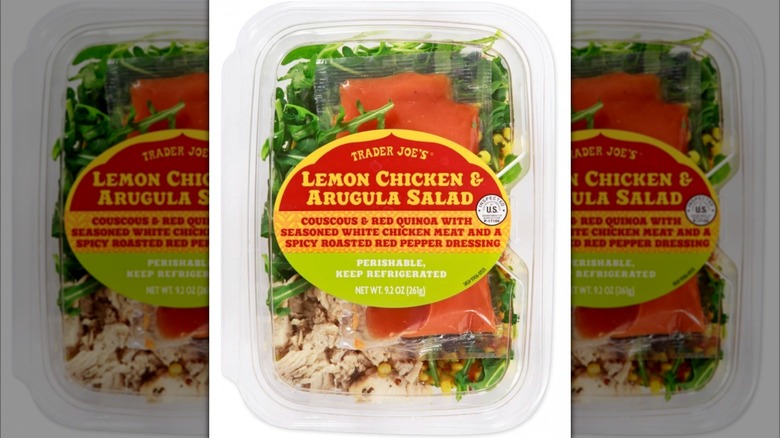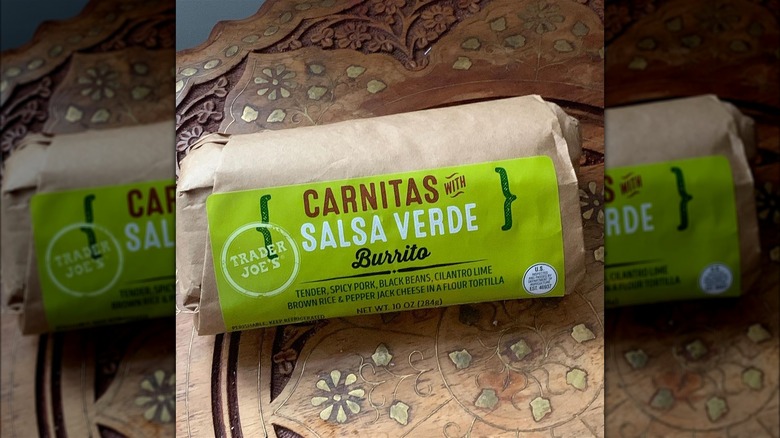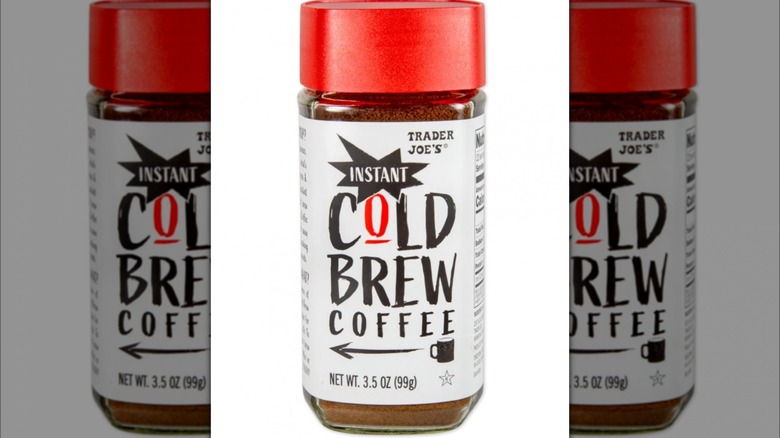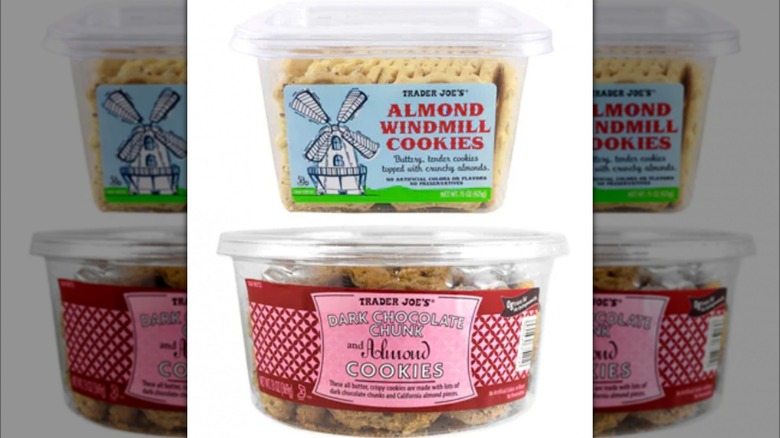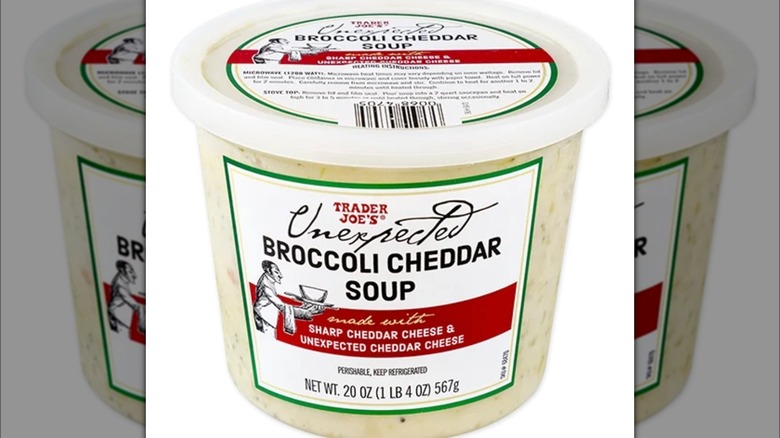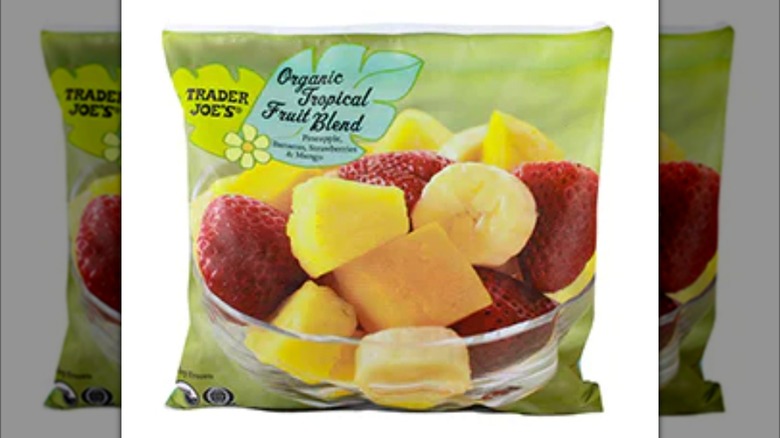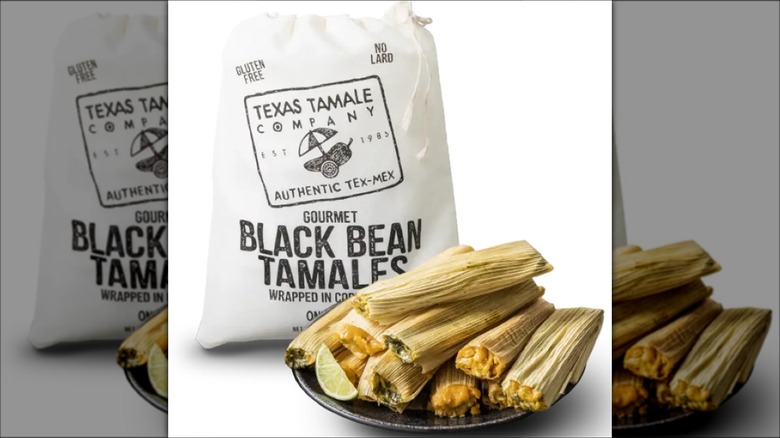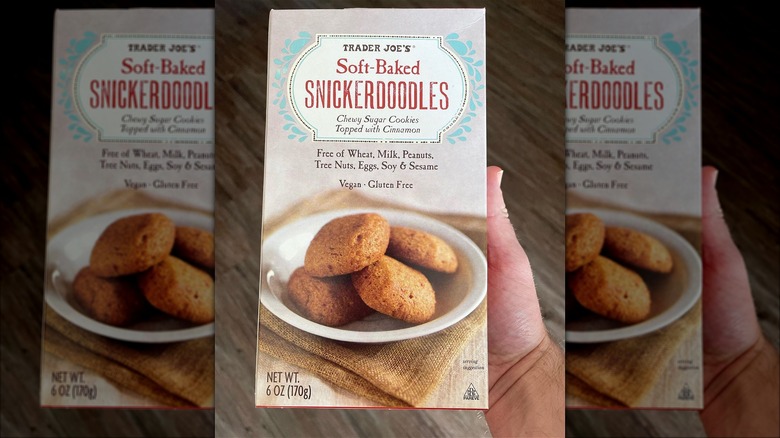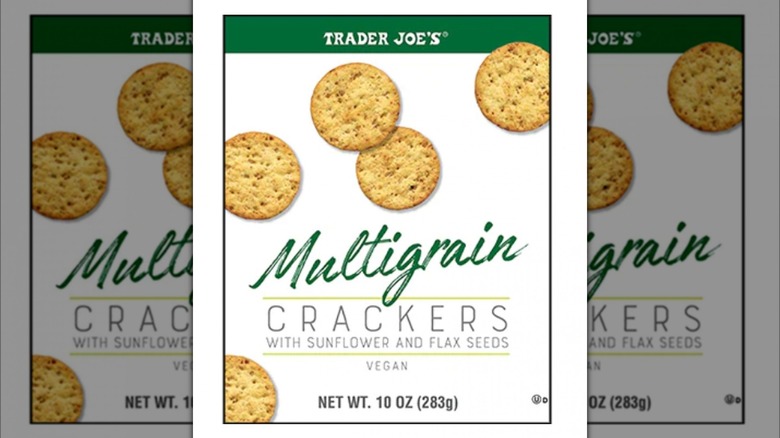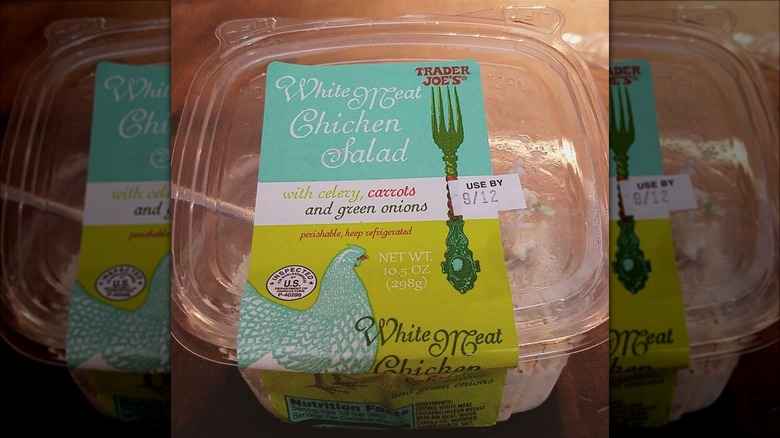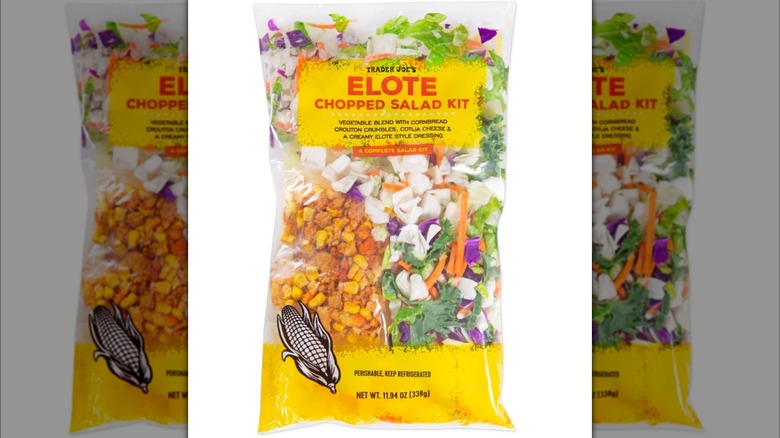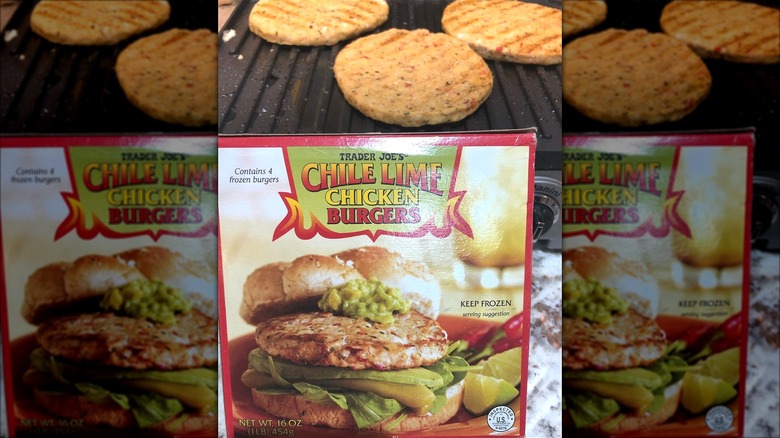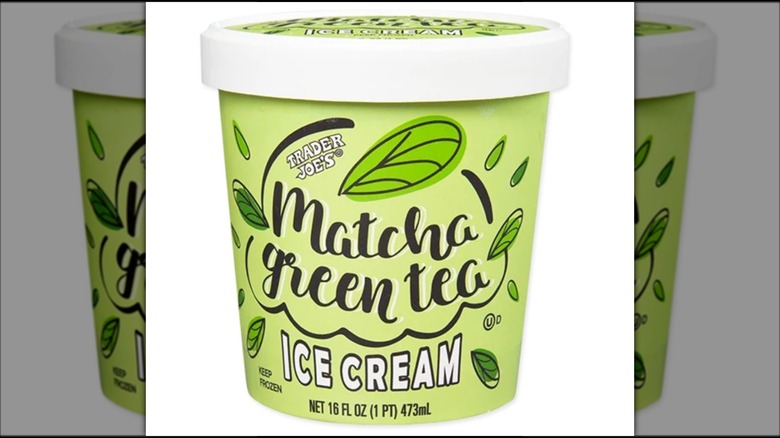The Biggest Recalls In Trader Joe's History
There's no other grocery store chain quite like Trader Joe's. With its unique array of affordable products, Hawaiian-shirted employees, and rotating seasonal favorites, it's found a way to be a budget-friendly version of Whole Foods without feeling like a compromise. After more than six decades in the business, it boasts over 570 stores across 43 states and is estimated to bring in about 18% of grocery store shoppers nationwide (per Statista). Its eponymous private label also garners the highest brand awareness of any organic food brand in the country, beating Whole Foods' private label 365 by 26 percentage points (per Statista).
More than 80% of Trader Joe's products are private label, meaning that only the company (or third-party contractors) produce these products, and only Trader Joe's can sell them. This helps the company keep prices low since middlemen like distributors and wholesalers are not involved. It also provides it with greater control over its supply chain, including the ability to quickly dream up, design, and sell unique products. While this certainly has its high-profile upsides, including the seemingly endless stream of quirky, one-of-a-kind customer favorites (Cookie Butter, anyone?), it also comes with risks. When Trader Joe's products get recalled, the company can't point the finger as easily as other grocery store chains since its name is almost always emblazoned on labels, and in recent years, this has led to some public embarrassment. From insects to metal, here are the biggest recalls that have tested the beloved company in recent years.
Trader Joe's Chicken, Lentil, & Caramelized Onion Pilaf
In February 2024, the U.S.D.A.'s Food Safety and Inspection Service (FSIS) issued a public health alert regarding a certain frozen ready-to-eat meal under the Trader Joe's label. The Chicken, Lentil & Caramelized Onion Pilaf is modeled after the classic Persian dish Adas Polo, and features a delicious mix of basmati rice, green lentils, caramelized onions, and chicken, with a host of additional flavorings like golden raisins, dates, cumin, and cinnamon. It's the kind of product that Trader Joe's customers love — nutritious, full of flavor, unlike the fare you'd find at other supermarkets, and exceedingly affordable.
Unfortunately, the batch that was called out by the FSIS also happened to have rocks in it. Yep, rocks, those definitely inedible things that we don't even like in our shoes, let alone our mouths. Food inspectors received multiple complaints from customers, one of whom, not surprisingly, suffered a dental injury. Shoppers were advised to check the establishment number on their pilaf and throw out any that were part of the offending batch. Although the incident may make some shoppers wary of repurchasing the product, it is still available for purchase — rocks not included.
Trader Joe's Lemon Chicken & Arugula Salad
One common reason for recalling products is mislabeling. For people with food allergies, warnings of trace ingredients can be a matter of life and death, and consequently, food inspection entities take the matter extremely seriously. Trader Joe's has fallen afoul of mislabeling on multiple occasions, including in early 2023 when it discovered that its Lemon Chicken & Arugula Salad sold in Idaho, Oregon, and Washington did not contain crucial allergen information about the inclusion of wheat. Although the products featured the correct top label, the bottom label was the ingredient statement for the Broccoli Slaw and Kale Salad with White Chicken Meat, which did not contain wheat. As a result, customers with severe wheat allergies were at risk, and the FSIS issued a recall. Luckily, no allergic reactions were reported.
The incident is one of many examples of how proactive food regulators are when such issues are flagged up. The FSIS urged customers who had purchased the mislabeled salad to throw them away or return them to the store immediately, even though people without wheat allergies would presumably have been okay to eat them.
Trader Joe's Carnitas with Salsa Verde Burrito
The illnesses caused by the bacteria Listeria monocytogenes and Salmonella are not to be taken lightly. Listeriosis sickens about 1,600 per year and kills about 260 of them (via the CDC). Pregnant women, newborns, and people over the age of 65 are most at risk, with symptoms including fever, muscle aches, loss of balance, headaches, and even seizures. Salmonella infections are much more common, with about 1.35 million cases in the U.S. each year, 26,500 hospitalizations, and 420 deaths (via the CDC). Symptoms include fever, diarrhea, and stomach cramps, and can last for up to a week. When manufacturers discover that their products might be contaminated with either bacterium, they take swift action. And when their products are contaminated with both, it's tantamount to a three-alarm fire.
In 2018, Trader Joe's was faced with this exact health emergency. Bakkavor Foods USA, one of its suppliers, recalled a whopping 795,261 pounds of ready-to-eat meat and poultry products that contained potentially contaminated onions (via FSIS). The Trader Joe's Carnitas and Salsa Verde Burritos were immediately pulled from shelves, with customers urged to throw them away if they had any in their fridges or freezers. Luckily, no illnesses were reported in connection with the recall.
Trader Joe's Instant Cold Brew Coffee
For many of us, making coffee in the morning is the preamble to properly waking up. Whether you're using a French press, a cafetière, or simply pouring a few tablespoons of instant powder into a mug, your brain is somewhere between autopilot and zombieland. Until you take that first sip, you may as well be snoring still. So, it must have come as a real shock to Trader Joe's customers to learn in early 2023 that their cups of morning brew might not be safe to drink. In March, the company issued a voluntary recall, explaining that it had been notified by its supplier that certain jars of Instant Cold Brew Coffee might contain shards of glass.
No injuries were reported, but some instant coffee devotees might have reconsidered their preferences. Your first cup of Joe needs to be strong enough to wake you up in the morning, but not, presumably, by slicing through your esophagus.
Trader Joe's Almond Windmill Cookies and Dark Chocolate Chunk and Almond Cookies
Trader Joe's is renowned for its cookies. From Chocolatey Coated Chocolate Chip Cookie Dunkers to the Speculoos biscuits used in its famous Cookie Butter, the chain makes sure that its customers have ample reason to swing by the bakery section during their weekly shopping trips. Customer enthusiasm may have been dampened, however, when the company had to recall two of its products due to rocks. Now, we're not sure about you, but the idea of biting into a gooey chocolate chip cookie and nearly losing a tooth on a stray pebble is not our preferred method of cookie consumption, and for parents wanting to surprise their kids with their favorite treat, the news may have induced mild panic.
Although there were no injuries reported and Trader Joe's assured its customers that it was alerted by the supplier about the issue rather than by an unfortunate member of the public, it was probably a bit embarrassing for executives when, less than a week later, the supermarket had to issue yet another voluntary recall due to — you guessed it — rocks. This time, the offending product was its Fully Cooked Falafel.
Trader Joe's Unexpected Broccoli Cheddar Soup
Now, we know that listeria and salmonella are dangerous and potentially deadly contaminants, but when you hear that your food might contain insects (and not even the culinary kind), we can't help but let out a silent scream of horror. It seems we're not alone, because when Trader Joe's announced in 2023 that its broccoli cheddar soup might contain insects, it made headlines across the internet, even on platforms that rarely comment on the food world. The company's plight was not helped by the fact that the official name of the product was "Unexpected Broccoli Cheddar Soup," an irony that, in this case, was all too real.
According to the FDA, the voluntary recall affected nearly 11,000 cases of the soup that were distributed throughout Florida, Illinois, California, Texas, Washington, Pennsylvania, and Connecticut. The agency elaborated on the Trader Joe's announcement, explaining that the insects were hiding in the broccoli florets. No adverse effects were reported from the incident, but we're not sure about the emotional state of those who might have spotted the "Unexpected" ingredients floating in their soup bowls.
Trader Joe's Organic Tropical Fruit Blend
Although so-called "foreign objects" like rocks and plastic are clearly a danger to the public when encountered in food, pathogens are arguably more dangerous and tend to make headlines. Such was the case when Trader Joe's recalled its Organic Tropical Fruit Blend, a mixture of frozen pineapple, mango, strawberries, and bananas, in March 2023. It was in response to an outbreak of Hepatitis A, a highly contagious virus with acute symptoms. The recall affected multiple retailers in addition to Trader Joe's, including Costco and Aldi.
A few months later, the same Trader Joe's product was hit with yet another recall, this time over fears of an even more dangerous contaminant: listeria. According to the Centers for Disease Control (CDC), listeria is the third leading cause of death from foodborne illness or food poisoning in the U.S., with about 1,600 cases each year. For obvious reasons, its potential infiltration into food is a major source of concern for supermarkets, and Trader Joe's issued an urgent appeal to its customers to throw away or return the Tropical Fruit Blend. Luckily, no listeriosis cases were reported as a result of consuming the product.
Texas Tamale Company Gourmet Black Bean Tamales
Unless you've worked in a food processing facility, you probably can't speak to the complexity that goes into the job. With such large-scale operations, it's surprising that things don't go wrong more often, a fact we're reminded of every time a company issues a food recall. One of the most common reasons for recalls is the mislabeling of products. Whether it's putting the wrong item into the wrong bag or mixing up nutrition labels, there are a lot of ways to mix things up. One Trader Joe's supplier did just that in 2023 when its Hatch Green Chile and Cheese Tamales, which contained milk, were mistakenly packaged in Black Bean Tamale Bags, which did not.
Under normal circumstances, this might not have caused much of a stir. No adverse health effects were reported as a result of the mistake, and the company immediately pulled the product from circulation. However, the news made headlines because it happened to be Trader Joe's sixth recall in less than six weeks, prompting media outlets to trumpet the concern of formerly devoted TJ's shoppers who had taken to social media to voice their mounting distress over the company's competence.
Trader Joe's Soft-Baked Snickerdoodles
As far as slam-dunk products go, the Trader Joe's Soft-Baked Snickerdoodles had it all. They had a soft, chewy texture, a dusting of cinnamon and sugar, and an oh-so-sweet price (only $3 for a whole dozen at one point). They were wheat-free, egg-free, soy-free, milk-free, and free from tree nuts, peanuts, and sesame. But somehow, they didn't taste like a vegan, gluten-free consolation prize for those starved of palatable diet-inclusive treats, they just tasted sublime. Unfortunately, despite all the ingredients they didn't have, a certain batch hit Trader Joe's shelves in 2022 that contained one extra ingredient: hard plastic.
Enjoy Life Natural Brands, which manufactured the cookies, issued the voluntary recall "out of an abundance of caution." No one wants to eat hard plastic in their cookies, soft-baked or otherwise, but this recall may have been the death knell to the beloved product. Not long afterward, customers started taking to Reddit to solve a mystery: the cookies had disappeared. Some commenters claimed that Trader Joe's was merely looking for a new manufacturer, while others pointed out that the same cookies were still being sold under the Enjoy Life Natural Brands packaging at other grocery chains. In early 2024, Trader Joe's released a new Snickerdoodle product featuring a flat rather than puffy shape and a crinkly texture akin to a classic sugar cookie. It received rave reviews from shoppers, but for those who remember the original Soft-Baked Snickerdoodle, it was not so easy to move on.
Trader Joe's Multigrain Crackers with Sunflower and Flax Seeds
There are a lot of so-called foreign objects that you can imagine sneaking their way into food products. A single human hair, for example, or a small piece of grit. You can even imagine how glass might have ended up in jars of Trader Joe's instant coffee. The jars were made of glass, after all, and it only takes a single broken one to throw shards everywhere. But metal? How does that get into your food?
Customers were left asking this question in the summer of 2023 when Trader Joe's supplier Treehouse Foods recalled 13,000 cases of Multigrain Crackers with Sunflower and Flax Seeds distributed around California, Connecticut, Florida, Illinois, Pennsylvania, Texas, and Washington due to fears that they contained pieces of metal. The information was sparse. Trader Joe's assured customers that no injuries had been reported and all products had been removed from circulation, but the question still lingers: how did metal get into the product and how did it manage to hide itself in nearly wafer-thin crackers?
Trader Joe's Chicken and Turkey Salad
Because one foreign object in your food just isn't upsetting enough, Trader Joe's was forced to recall several types of chicken and turkey salad in 2017 because they might have contained both silica and glass. To the screeching howls of dentists across the nation, the F.D.A. announced that Green Cuisine, the supplier of several ready-to-eat products sold under the Trader Joe's brand, had been alerted of the issue by customers. It recalled three products, White Meat Chicken Salad with Celery, Carrots, and Green onions; Curried White Chicken Deli Salad with Toasted Cashews, Green Onion, and a Bit of Honey; and Turkey Cranberry Apple Salad Turkey Breast Meat with Sweet Dried Cranberries, Tangy Green Apples, Pecans, and Sage.
The recalled batches were sold throughout 12 states, including California, Texas, and Washington. All in all, the company recalled over 65,000 pounds of the stuff, while the F.D.A.'s announcement urged customers to either throw away any previously purchased products that fit the description or return them to the store.
Trader Joe's Chicken Enchiladas Verde, Cilantro Salad Dressing, and Elote Chopped Salad Kit
Recalls often provide an unusual glimpse into the secretive supply chains that fuel our food consumption. Unlike the supermarkets whose shelves they stock, manufacturers are rarely household names, and when one announces a recall, the list of grocery stores it comes into contact with can be surprising. One such incident arose in February 2024 when the F.D.A. announced a far-reaching recall of dairy products made by Rizo-Lopez Foods, Inc. due to listeria contamination. It involved over a hundred products sold under a head-spinning number of familiar brands including Trader Joe's, Dole, Whole Foods 365, Safeway, Costco, and HEB.
Unlike many other recalls, which are issued before any customers fall ill, this one was related to an outbreak of listeriosis, the illness caused by the Listeria monocytogenes bacterium, that had been ongoing since 2014. Only 26 cases were confirmed, but 23 resulted in hospitalization and two resulted in death. The recall affected stores across the U.S. and into Canada and included products like Whole Foods 365 Ricotta Cheese, Trader Joe's Chicken Enchiladas Verdes, Dole Chopped Avocado Ranch Kit, and Costco Chicken Street Taco Kit.
Trader Joe's Chili Lime Chicken Burgers
"Bone fragments" is not a phrase you want to hear in connection with anything, whether it's food, an X-ray, or the construction site of the house you're building. In 2021, certain Trader Joe's customers experienced the proverbial shiver down the spine when the company released a statement explaining that some of their products might be hiding pieces of bone. Oops. The offending products weren't filets of fish, which often have long, needle-like bones inside them, but the fan favorite Chili Lime Chicken Burgers. Made with ground chicken, onions, bell peppers, garlic, and lime juice concentrate, they provided the perfect mix of flavors without detracting from all the fixings.
When the company received complaints about the beloved burgers' accidental ingredient, nearly 100,000 pounds of the product were recalled. It was a large quantity, but shoppers had every reason to believe that once the usual safety checks had been administered, their favorite burgers would be back in store freezers for the long haul. Sadly, however, Trader Joe's discontinued the burgers sometime later, without fanfare. There is no evidence to connect this decision with the 2021 recall, but customers were left scratching their heads and reluctantly rearranging their summer meal plans.
Trader Joe's Matcha Green Tea Ice Cream
One of the most prominent examples of how Trader Joe's differentiates itself from its competitors is the ice cream department. From the frozen spin on their iconic Cookie Butter to the lavender-hued Ube Ice Cream, the chain keeps things original, and customers keep coming back for more. But things got a little too original in the frozen treats aisle in 2017 when tiny metal fragments were found in the chain's Matcha Green Tea Ice Cream. The lime-colored dessert had been a favorite of many shoppers for its sweet, faintly grassy flavor and rich, velvety texture, but even die-hard fans will draw the line at metal.
Trader Joe's removed the product from its freezers and issued an appeal to its customers to throw away any pints they might have at home. It assured consumers that no injuries were associated with the recall, but did not reveal how it became aware of the metal fragments, nor did it answer the most pressing question of all: how metal got into the ice cream in the first place.

